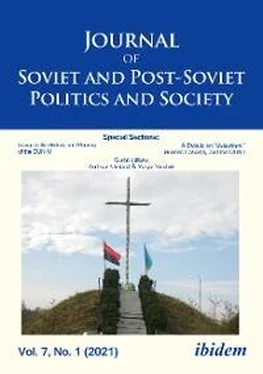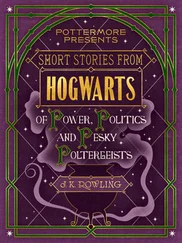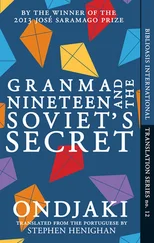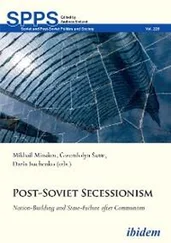ibidem-Press, Stuttgart
Contents
SPECIAL SECTION: ISSUES IN THE HISTORY AND MEMORY OF THE OUN IV SPECIAL SECTION: ISSUES IN THE HISTORY AND MEMORY OF THE OUN IV GUEST EDITED BY YULIYA YURCHUK AND ANDREAS UMLAND
Introduction Studies in the Course and Commemoration of the OUN’s Anti-Soviet Resistance* Introduction Studies in the Course and Commemoration of the OUN’s Anti-Soviet Resistance* Yuliya Yurchuk and Andreas Umland This is the fourth installment in a series of thematic JSPPS sections of research papers on the memory and history of the Organization of Ukrainian Nationalists (OUN) as well as the OUN Bandera-wing’s military arm, the Ukrainian Insurgent Army (Ukr. abbrev.: UPA). 1 Within this series, historians and social scientists detail findings from their research on interwar and war-time Ukrainian radical nationalism as well as its contemporary public and scholarly interpretations and representations—not least, against the background of the Russian–Ukrainian war since 2014, and its related propaganda campaigns. 2 The third 2020 special section, for instance, dealt with the OUN’s and UPA’s complicated relationship to German Nazism, the participation of OUN members in the Holocaust, and the issue of whether certain East European ultra-nationalist movements like the OUN or the Ustaša should be classified as fascist. 3
NKVD Internal Troops Operations against the Ukrainian Insurgent Army in 1944–45
History Education and Reconciliation: The Ukrainian Nationalist Underground Movement in Secondary School Curricula, Textbooks, and Classroom Practices (1991–2012)
Observing Trends in Ukrainian Memory Politics (2014–2019) through Structural Topic Modeling
SPECIAL SECTION: A DEBATE ON “USTASHISM,” GENERIC FASCISM, AND THE OUN I
Introduction Discussing Ukrainian Historical Ultra-Nationalism in Comparative Perspective*
On Ustashism and Fascism: A Response to Critics
Fascism, Ustashism, and the Ecumenical Application of Ideal Types
A New Turn: On the Need for a Transnational Interpretation of the Ustaša and OUN
Accommodating “Stateless Nations” in the Conceptualization of Fascism
Gravity of Void: Remarks on the Structural Consistency and Empirical Validity of the Notion of “Ustashism”
“Saving the OUN from a Collaborationist and Possibly Fascist Fate:” On the Genealogy of the Discourse on the OUN’s “Non-Fascism”
Reviews
Thane Gustafson, The Bridge: Natural Gas in a Redivided Europe. Harvard University Press, 2020.
Maria A. Rogacheva, Soviet Scientists Remember: Oral Histories of the Cold War Generation. Lexington Books, 2020.
Zuzanna Bogumił, Gulag Memories: The Rediscovery and Commemoration of Russia’s Repressive Past. Trans. from the Polish by Philip Palmer. Berghahn Books, 2018.
Bettina Renz, Russia’s Military Revival. Polity, 2018.
Marlene Laruelle (ed.), The Nazarbayev Generation: Youth in Kazakhstan. Lexington Books, 2019.
Beth A. Fischer, The Myth of Triumphalism: Rethinking President Reagan’s Cold War Legacy. University Press of Kentucky, 2020.
Victoria Donovan, Chronicles in Stone: Preservation, Patriotism, and Identity in Northwest Russia. Northern Illinois University Press, 2019.
Brandon M. Schechter, The Stuff of Soldiers: A History of the Red Army in World War II through Objects. Cornell University Press, 2019.
Andrew Monaghan, Dealing with the Russians. Polity, 2019.
About the Guest Editors
SPECIAL SECTION:
ISSUES IN THE HISTORY AND MEMORY OF THE OUN IV
GUEST EDITED BY
YULIYA YURCHUK AND ANDREAS UMLAND
Introduction
Studies in the Course and Commemoration of the OUN’s Anti-Soviet Resistance*
Yuliya Yurchuk and Andreas Umland
This is the fourth installment in a series of thematic JSPPS sections of research papers on the memory and history of the Organization of Ukrainian Nationalists (OUN) as well as the OUN Bandera-wing’s military arm, the Ukrainian Insurgent Army (Ukr. abbrev.: UPA). 1Within this series, historians and social scientists detail findings from their research on interwar and war-time Ukrainian radical nationalism as well as its contemporary public and scholarly interpretations and representations—not least, against the background of the Russian–Ukrainian war since 2014, and its related propaganda campaigns. 2The third 2020 special section, for instance, dealt with the OUN’s and UPA’s complicated relationship to German Nazism, the participation of OUN members in the Holocaust, and the issue of whether certain East European ultra-nationalist movements like the OUN or the Ustaša should be classified as fascist. 3
Debating Ukrainian Nationalism’s World War II Record
These and other recent peer-reviewed papers have provided the background for the start of a separate series of—at least, two— JSPPS special sections under the title “A Debate on ‘Ustashism,’ Generic Fascism, and the OUN,” the first installment of which is printed in this issue. 4This discussion complements our earlier research articles—including the present ones—on the OUN, yet markedly departs from traditional collected editions. The ustashism debate in JSPPS , to be sure, also refers to a plethora of empirical details and contains some relevant quotes, as ordinary academic papers and the present series of special sections do.
Yet, the ustashism debate consists of uniformly non-reviewed and largely disputational commentaries rather than research articles proper. Within the series “A Debate on ‘Ustashism’, Generic Fascism, and the OUN,” a variety of scholars in the fields of comparative fascism, East European right-wing extremism, and Ukrainian ultra-nationalism discuss a 2015 seminal paper by Oleksandr Zaitsev (Ukrainian Catholic University at L’viv) on the OUN’s “ustashism,” in the journal Communist and Post-Communist Studies . 5A first response to Zaitsev’s paper was published in 2020 in JSPPS in the form of a research paper by two specialists on the Ustaša, Tomislav Dulić and Goran Miljan (Uppsala University), who focused on the relationship between fascism and abolitionism. 6For the “Debate on ‘Ustashism’, Generic Fascism and the OUN,” we have asked a number of experts on the East European far right, historical Ukrainian nationalism, and comparative fascism to voice their opinion on the different approaches to the OUN by Zaitsev, and Dulić/Miljan.
In our 2017, 2018, and 2020 introductions to the first three sections “Issues in the History and Memory of the OUN,” freely accessible on the JSPPS website, we reflected upon topical events in Ukraine at that time, as well as on ongoing memory production and historical debates related to historical Ukrainian radical nationalism. We briefly chronicled and contextualized Ukraine’s peculiarly evolving Vergangenheitsbewältigung (coming to terms with the past) before and after the Euromaidan. 7In our last introduction of early 2020, we noted that the election of Volodymyr Zelens’kyi as President of Ukraine and the departure of the incumbent Petro Poroshenko, contrary to some observers’ expectations, had not resulted in an about-face when it came to governmental Ukrainian memory approaches with regard to the OUN. In early 2021, this statement still holds.
The new director of the Ukrainian Institute of National Remembrance (UINP) attached to the Cabinet of Ministers of Ukraine, Anton Drobovych, appointed in December 2019, changed the vector of the Institute’s work only moderately. Under Drobovych’s leadership, the UINP’s main activities have entailed a stronger focus on promotion of some relatively new themes in government-supported national memory like, for instance, such historic figures as the legendary football player and coach Valeriy Lobanovs’kyy (1939–2002), or the world-famous avant-garde artist and art theorist Kazimir Malevich (1879–1935). By early 2021, the policies of the Remembrance Institute’s new leadership since 2019 have not produced any debates comparable to the heated discussions prompted by the 2014–2019 UINP head Volodymyr V’iatrovych’s advocacy for a hagiographic OUN commemoration. 8
Читать дальше












